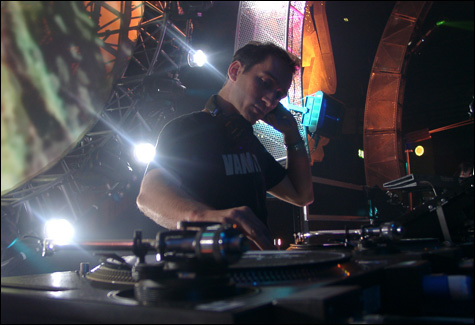
Paul Van Dyk |
After numerous attempts, Up All Day got through to PAUL VAN DYK at his office in Berlin. The German capital is ground central for the new techno explosion, and he has a hectic schedule, but I managed a few words from the reigning champ of DJs — named #1 in the world by DJ magazine — before his Avalon appearance this Friday, June 15. “Avalon Boston is one of the best clubs in the world. I always have a fantastic time there. It’s always a very intense atmosphere.”
Van Dyk’s sets are certainly intense — a combination of slammin’ trance music and ambient sound. It’s delirium in a bottle, clean and clear. As a fan and a producer of electronic music since his earliest days in East Germany, Van Dyk (né Matthias Paul, in Meißen) is always on the cutting edge of technology; in his recent appearances, he’s gone far beyond playing tracks. “To be honest, just playing a CD or just playing vinyl is not appealing to me anymore. I would probably just stand there and wait for the track to be over so I have something to do. When you see me play, it’s really like a live set-up. I have two computers linked with each other. I have audio elements on one computer and MIDI and software synthesizers on the other one, and a special mixer from Allen & Heath with a MIDI controller where I can drive in loops and effects and all this stuff. Electronic music has always been about breaking the boundaries by using the latest possibilities. It’s so much more fun. I am so much more busy as well.”
He laughs. “Now I am playing bass lines, I am sequencing things, I am playing strings on top of things, kicking effects in, EQing things. I am rearranging the track all the time. It’s not about playing the right track at the moment. It’s about playing the right elements of the right track in the right way to get it to the right moment. It’s to the point now that whatever I can do in the studio I can do live.”
Like most other electronic-music aficionados, Van Dyk ascribes dance music’s growing popularity to technology. “With digital distribution, more people hear about stuff that before was only sold in a few select record stores in Berlin and elsewhere. So the new Berlin sound has always been here.” But the world’s biggest name also sees the downside of his adopted home town. “People, as soon as they arrive here, they get really lazy because they don’t have to work as hard. As soon as they are here, nothing happens anymore. It hasn’t changed in 15 years. It’s the same boring bullshit.”
What about being named the world’s #1 DJ? “I don’t see it as competition, because there are so many variations of electronic music on that list [of DJs]. It’s a global phenomenon, that’s what these lists say to me.” And despite the demise of the Big Beat sound in the US and UK, he still believes in electronic music’s future. “It’s the only musical style I see a constant growth in. The reception of it is disappointing — you hear electronic music in countless commercials, countless TV trailers, but you don’t really know that there is a global scene behind it.”